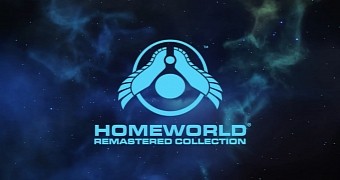Homeworld Remastered Collection is a great way for any gamer who wants to experience a piece of gaming history to get access to two of the best space-based strategy titles ever released, but it also raises some questions about what we consider to be classic games and how they should be handled in the future.
Relic Entertainment was the developer for both of the titles, which were brought to market by Sierra Entertainment, a company that no longer exists in any meaningful form at the moment.
For a long time, there was no other way to get access to Homeworld than hunting down a number of limited second-hand copies, which tended to be unreliable when running on modern machines.
The problem was compounded by the fact that Relic was not interested in working on Homeworld anymore and by the problems associated with its ownership.
Then, Gearbox found the resources to buy all the rights it needed to work on the Remastered Collection package, but the company did not manage to get everything attached to the franchise (Cataclysm, an expansion for the original, is not included).
The new and improved versions of the two space strategy titles were launched to almost universal acclaim, and if they sell well, a full Homeworld sequel might be created.
Classic series and the unknown
In an ideal world, videogames would be constructed in such a way that publishers would have the ability to adapt them to any new hardware quickly, making it easy for successive generations of players to see the highlights of the previous eras.
It would also help if a process existed to allow a company that closed down to make it clear how its code and assets could be opened up so that fans and other interested groups could use it to keep its games alive.
There are initiatives like museums and archives which seek to preserve video games in order to make sure that the industry does not lose important titles, but their resources are limited and so many experiences are being introduced in a month that they cannot keep up.
The industry, through the ESA and other organizations, could try to improve funding and institute more procedures to keep video games safe for the future, but making content open source after a while would mean that the fans, those who have an emotional attachment to a series, will try to preserve them.
Of course, companies, even those that are on the brink of disappearing, will not be happy to give away their intellectual properties, so it's improbable that we will see an open approach become the norm in the coming years.
The past informs the future
For a long time, the video game industry looked ever forward, with teams trying to find new ways to use limited hardware to deliver better gaming experiences for players.
Older titles have been seen as something we could ignore in our race to move towards better graphics, smarter AI, and better multiplayer, and have been considered the domain of those who were too nostalgic or those who fashioned themselves historians.
But the past, with its triumphs and mistakes, is very important for those who want to shape the future and for those who want to consume it.
Homeworld, both in its original form and its Remastered one, shows how solid gameplay and an interesting story can make an experience all but future proof and enjoyable for all those who understand what it has to offer.
Yet, it was a struggle to actually launch the new collection and the industry needs to change that in order for future gamers to be able to play and appreciate the best of the present.

 14 DAY TRIAL //
14 DAY TRIAL //